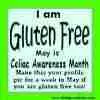-
Welcome to Celiac.com!
You have found your celiac tribe! Join us and ask questions in our forum, share your story, and connect with others.
-
Celiac.com Sponsor (A1):
Celiac.com Sponsor (A1-M):
-
Get Celiac.com Updates:Support Our Content
-
Get Celiac.com Updates:Support Celiac.com:
-
Celiac.com Sponsor (A17):
Celiac.com Sponsor (A17):
Celiac.com Sponsors (A17-M):
-
Recent Activity
-
- Scott Adams replied to xxnonamexx's topic in Post Diagnosis, Recovery & Treatment of Celiac Disease5
My journey is it gluten or fiber?
In general if it is certified gluten-free serious steps are taken to avoid cross-contamination, but things can still happen in a shared facility, and gluten-free certification isn't a guarantee, as we've seen recently: -
- Scott Adams commented on Scott Adams's article in Skin Problems and Celiac Disease3
Celiac Disease and Skin Disorders: Exploring a Genetic Connection
I had a variety of skin issues while growing up that were likely related to celiac disease, although I did not get full blown celiac disease until I was in my early 20's. I had topical dermatitis in certain areas, blepharitis (eyelids), and a patch of dermatitis herpetiformis on the back of my right-thumb area. I do believe that many people who have the genetic...- atopic dermatitis
- autoimmune diseases
- (and 8 more)
-
- Scott Adams replied to EndlessSummer's topic in Related Issues & Disorders3
Dizziness after eating green beans?
As already mentioned here, and based on your description, this sounds like a serious and specific reaction to green beans. While your prior allergy tests didn't flag legumes, it's possible to develop a new allergy at any time. The symptoms you describe—extreme dizziness, racing heart, sweating, and itching—are consistent with a systemic allergic response, no... -
- Scott Adams commented on Jefferson Adams's article in Other Diseases and Disorders Associated with Celiac Disease7
Celiac Disease Patients Face Higher Risk of Systemic Lupus
I recommend you start a thread on this topic in our forum, rather than comment on an article about Lupus.- celiac
- celiac disease
- (and 5 more)
-
- Eric.C posted a topic in Post Diagnosis, Recovery & Treatment of Celiac Disease0
Slow healing?
I was diagnosed with celiac disease in October last year and followed a strict gluten free diet since then. My dietitian told me that my diet looks absolutely perfect and I can’t think of many possible ways to get cc as I am very strict. However, when I did my check up gastroscopy a year later my healing only showed a slow improvement going from marsh 3b...
-




